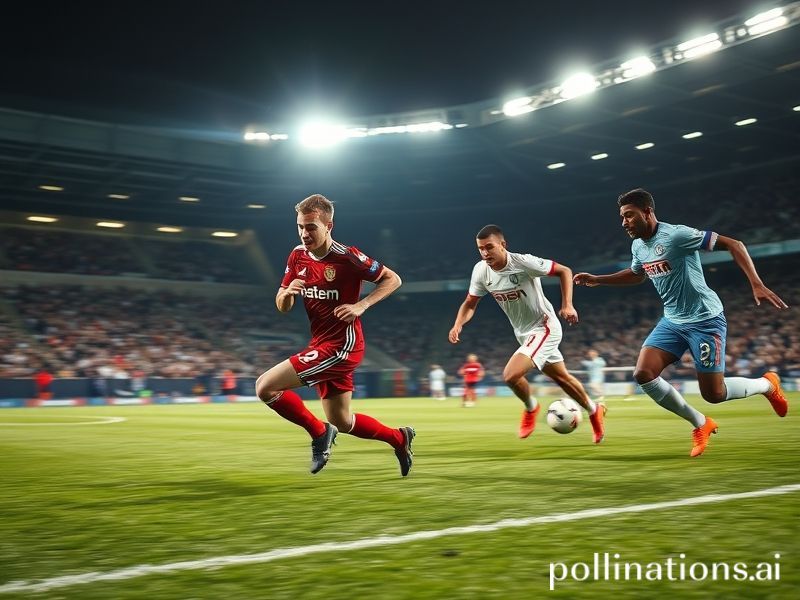Copenhagen vs Leverkusen: When Nordic Welfare Meets German Efficiency in a Post-Truth Europa League
COPENHAGEN, Denmark — On Thursday night the Parken Stadium will throb with the sort of optimism Scandinavians normally reserve for tax-return season. FC Copenhagen, a club whose annual budget is roughly what Bayer Leverkusen spends on sports-science smoothies, welcomes the newly-crowned “Neverlusen” for the first leg of a Europa League quarter-final. Bookmakers have installed the Germans as favorites, presumably because they have already mathematically clinched the Bundesliga, the Pokal, and, if rumors are true, the Nobel Prize in Chemistry.
This is not merely 22 millionaires in fluorescent boots chasing probability. It is a geopolitical morality play wrapped in polyester. Copenhagen carries the banner of the Nordic social contract—equal pay, recycled kits, bicycles chained outside the VIP entrance—while Leverkusen is the sleek pharmaceutical arm of capitalism-on-steroids, literally. One club is owned by fans who vote on beer prices; the other is a wholly-owned subsidiary of Bayer AG, which once trademarked heroin and now sells aspirin to cure the headaches it originally caused. If you cannot spot the metaphor, you are probably still waiting for your quarterly dividend.
For the wider world, the tie is a stress-test on two competing models of football governance. Copenhagen’s wage ceiling is so aggressively egalitarian that their top earner reportedly makes less per month than a single TikTok influencer spends on vitamin drips. Leverkusen, meanwhile, have a squad assembled with the cold efficiency of a German patent application: Xhaka running midfield like a well-regulated autobahn, Wirtz slicing defenses the way the EU Commission slices trade deals—clean, precise, and without visible emotion.
The outcome will reverberate from Lagos living rooms to Singapore betting shops. In Africa, where satellite dishes bloom atop corrugated roofs like metallic mushrooms, viewers will debate whether disciplined German engineering can be overcome by Viking chaos and, more importantly, whether the stream will buffer during stoppage time. In Asia, the match is already priced into cryptocurrency markets; a Copenhagen upset could tank the Leverkusen fan-token faster than you can say “rug pull.” And in North America, where soccer is still treated as an artisanal hobby alongside pickleball, ESPN will cut to commercial just as a penalty is about to be taken, presumably to reassure viewers that nothing important ever happens in soccer anyway.
Climate scientists, bless their permanently gloomy hearts, will note the 800-kilometre flight undertaken by Leverkusen despite Europe’s rail network being denser than a Christmas fruitcake. UEFA, which likes its carbon footprint the way it likes its Swiss bank accounts—ample and discreet—has already offset the emissions by planting three shrubs and issuing a 47-page sustainability report nobody will read. Greta Thunberg, Denmark’s favorite export after hygge and existential dread, may well unfurl a protest banner, assuming she can get past security disguised as a linesman.
Then there is the narrative arc of human hope versus the algorithmic certainty of data. Copenhagen fans still believe in fairy tales, possibly because their tax dollars fund them. Leverkusen fans have downloaded an app that predicts victory to three decimal places and sends push-notifications whenever Florian Wirtz breathes. Somewhere in between lies the beautiful game, staggering under the weight of VAR, NFT ticket stubs, and a halftime show featuring recycled Eurovision props.
Come full-time, the scoreboard will display a result, but the ledger of life will record something larger. Either the plucky welfare-state underdogs nick an away goal and postpone the triumph of late-stage capitalism for another week, or the relentless German juggernaut grinds on, proving—once again—that the house always wins, especially when the house has a line of anticoagulants on the side.
Either way, we’ll all wake up Friday to headlines, hot takes, and the crushing realization that none of it will lower the price of eggs. Football, after all, is the most important of the unimportant things—unless you’re the chap who bet his mortgage on a Copenhagen clean sheet. In which case, may your therapist accept crypto.







